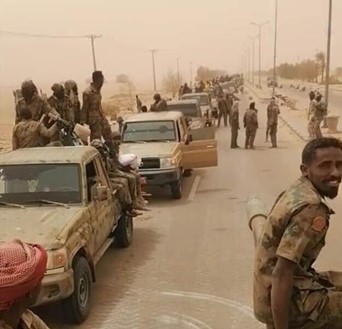
RSF-fighters-cross-Hantoub-bridge-after-the-withdrawal-of-the-Sudanese-forces-on-December-18-2023
“The war our country is experiencing today must be the last war.”
On 6 January, Mohamed Hamdan Dagalo, the leader of the Sudanese Rapid Support Forces (RSF) (a paramilitary force formerly overseen by the Government of Sudan which has since defected), known as “Hemedti,” wrote the excerpted post in Arabic language on X (formerly Twitter) about his trip to Rwanda to meet President Kagame, and visit the Genocide Memorial Museum in Kigali. Hemedti’s remarks about the trip framed his own objectives in Sudan as mirroring those he perceives Kagame has achieved in Rwanda. Hemedti stated that Rwandans faced their problems after their civil war and genocide with courage and found radical solutions, such as gacaca,[i] which Hemedti compared to judiya,[ii] or traditional mediation, in Darfur, Sudan. It appears Hemedti is open to an elder council in Sudan that would oversee conflict resolution in the country but, the council would ensure Hemedti’s paramilitary faction retaining power over the rival Sudanese Armed Forces (SAF).[iii]
Hemedti was initially seen as the underdog in the conflict with the SAF, Sudan’s officially recognized Army. However, his fighters’ brutal guerilla warfare tactics, honed when they operated as the notorious janjaweed in Darfur in the 2000s, have outmaneuvered the more conventional SAF. Moreover, Hemedti’s and his fighters’ humble beginnings—at least until they began monopolizing gold and other resource-rich mines in Darfur—may have endeared them to sectors of the embattled Sudanese population, which views the SAF as hopelessly corrupt and elitist and a continuation of the now-defunct Islamist regimes of previous decades. Hemedti added during his visit to Kigala that the ongoing Sudanese civil war must be the country’s “last war” and the experiences of other countries, particularly Rwanda, where Kagame has remained in power since the end of the Rwandan civil war, could inform Sudan’s own next steps. Hemedti’s remarks come as the Arabic-language website of the British newspaper, The Independent, published the second excerpted article about the SAF’s rejection of an invitation to attend the Intergovernmental Authority on Development’s East African Summit in Uganda, which would involve mediation between the SAF and RSF. The article notes the RSF would be negotiating with the SAF from a position of strength having continuously seized territory in Sudan. This may be why Hemedti has been touring Rwanda, among other East African nations, in anticipation of the RSF’s taking control of more parts of Sudan. Further, Hemedti is seemingly planning a Rwandan-style post-conflict transitional justice system in Sudan that, like with Rwanda’s Kagame, would see Hemedti remain in power for years to come.[iv]
Sources:
“زرت اليوم المتحف التذكاري للإبادة الجماعية بالعاصمة الرواندية كيجالي(Today I Visited the Genocide Memorial Museum in the Rwandan Capital, Kigali),” Twitter.com (@GeneralDagllo) (U.S social media website allowing users to freely post text, images, and videos known as “tweets”), 6 January 2024. https://twitter.com/GeneralDagllo/status/1743703088676897259
Today I visited the Genocide Memorial Museum in the Rwandan capital, Kigali. It is one of the most important landmarks in human history, because it witnessed a period of suffering and tragedy…. The Rwandans themselves faced their problems with courage and found radical solutions through the experience of gacaca, which is similar to judiya in Sudan. This system established the principles of transitional justice in society, realized the idea of no impunity, and changed history from division to unity.
We, Sudanese, must learn from Rwanda. The war our country is experience today must be the last war, and we must work to create a fair and sustainable peace for ourselves and for the future for our coming generations.
“السودان يعلق وساطة “إيغاد” وسط احتدام المعارك” (Sudan suspends IGAD mediation amid increasing battles),” independentarabia.com (Arabic-language website jointly administered by Media Arabia, and The Independent, which focuses on social and humanitarian evens in the Middle East) 16 January 2024. https://www.independentarabia.com/node/538051/%D8%B3%D9%8A%D8%A7%D8%B3%D8%A9/%D9%85%D8%AA%D8%A7%D8%A8%D8%B9%D8%A7%D8%AA/%D8%A7%D9%84%D8%B3%D9%88%D8%AF%D8%A7%D9%86-%D9%8A%D8%B9%D9%84%D9%82-%D9%88%D8%B3%D8%A7%D8%B7%D8%A9-%D8%A5%D9%8A%D8%BA%D8%A7%D8%AF-%D9%88%D8%B3%D8%B7-%D8%A7%D8%AD%D8%AA%D8%AF%D8%A7%D9%85-%D8%A7%D9%84%D9%85%D8%B9%D8%A7%D8%B1%D9%83
The Sudanese Ministry of Foreign Affairs announced that Sudan has suspended its dealings with the Intergovernmental Authority on Development (IGAD) of East African Countries, which has mediated the months-long fighting between the army and the paramilitary Rapid Support Forces (RSF). IGAD offered to mediate between the army commanders and the RSF.
Notes:
[i] “Gacaca” courts played a role in transitional justice in Rwanda following the 1994 genocide and were known for being community-based and for providing lighter sentences to perpetrators who showed remorse and repentance and sought reintegration into their communities.
[ii] “Judiya” has been the main mechanism for traditional mediation, reconciliation and justice in Darfur, Sudan, where “al-Jaweed,” or respected elders and traditional leaders, engage in third-party mediation with the approval of conflict actors. Although it is yet to be fully established in Darfur, advocates remain optimistic that it could bring a new sense of “humanitarian diplomacy” to that region, see: Yasir Elfatih Abdelrahim Elsanousi, “Traditional Judiya Leaders in Sudan as Actors of Humanitarian Diplomacy: Are They Eligible to Fulfill These Roles in the Darfur Humanitarian Crisis?,” Journal of African Studies and Development, Vol 3 (2), July 2017. https://www.researchgate.net/publication/329100692_Traditional_Judiya_Leaders_in_Sudan_as_Actors_of_Humanitarian_Diplomacy_Are_They_Eligible_to_Fulfill_These_Roles_in_the_Darfur_Humanitarian_Crisis
[iii] In Sudan, the Sudanese Armed Forces (SAF), which are led by General Abd al-Fatah al-Burhan, are in conflict with Rapid Support Forces (RSF) paramilitaries, which are led by “Hemedti.” When al-Burhan became the Sudanese leader after long-time dictator Omar al-Bashir was overthrown in 2019, he failed to rein in and incorporate Hemedti’s RSF into the SAF. This ultimately resulted in a power struggle when, in April 2023, al-Burhan called the RSF a “rebel” movement and formally dissolved it. The two military factions have been at war since then and have received backing from external powers, but as of early 2024, the RSF has the upper hand in the fighting. See: Andrew McGregor, “Gold, Arms, and Islam: Understanding the Conflict in Sudan,” Terrorism Monitor Volume: 21 Issue: 9 April 2023. https://jamestown.org/program/gold-arms-and-islam-understanding-the-conflict-in-sudan/
[iv] Besides Rwanda, Hemedti has also met with leaders in Uganda, Ethiopia, Kenya, South Africa, Djibouti since the start of the war with the SAF in April 2023.
Image Information:
Image: RSF-fighters-cross-Hantoub-bridge-after-the-withdrawal-of-the-Sudanese-forces-on-December-18-2023
Source: The Sudan Tribune,https://commons.wikimedia.org/wiki/File:RSF-fighters-cross-Hantoub-bridge-after-the-withdrawal-of-the-Sudanese-forces-on-December-18-2023.jpg
Attribution: CC x 2.0
